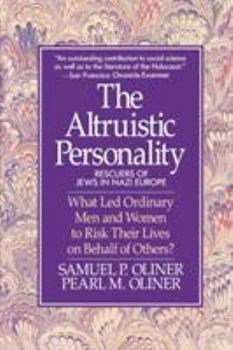Altruistic Personality: Rescuers of Jews in Nazi Europe
Select Format
Select Condition 
Book Overview
An enligtening and powerful exploration of those who risked their lives to help others during the Holocaust--and those who did not--and what we must do to ensure that such a tragedy never occurs again. Why, during the Holocaust, did some ordinary people risk their lives and the lives of their families to help others--even total strangers--while others stood passively by? Samuel Oliner, a Holocaust survivor who has interviewed more than...
Format:Paperback
Language:English
ISBN:0029238293
ISBN13:9780029238295
Release Date:April 1992
Publisher:Touchstone Books
Length:448 Pages
Weight:1.60 lbs.
Dimensions:1.1" x 6.1" x 9.0"
Related Subjects
Discrimination & Racism Ethics & Morality Health, Fitness & Dieting Health, Fitness & Dieting History Judaism Military Personality Politics & Social Sciences Psychology Psychology & Counseling Race Relations Religion & Spirituality Social Psychology & Interactions Social Science Social Sciences World War IICustomer Reviews
2 ratings
The Rescue of (Mostly Polish) Jews, Future Extermination of Poles, "Jewish Passivity", etc.
Published by Thriftbooks.com User , 18 years ago
The head author, Samuel Oliner, was a rescued Polish Jew when a boy. This work analyzes the motives and attitudes of those who rescued Jews, and attempts to compare them with a control group of co-nationals who did not engage in such rescue. In addition, this book presents excellent historical context to the events it describes, and it is this historical context that is the focus of this review. The authors have a good grasp of the chief cause of prewar Polish-Jewish tensions: "The conspicuous roles of Jews as merchants, money-lenders, estates supervisors, and tax collectors in medieval Poland eventually attracted the hostility of Poles from social classes either aspiring to these positions or suffering under the policies Jewish middlemen enforced for kings and nobles." (p. 27). Oliner and Oliner place the destruction of 90% of Poland's Jews in the context of German exterminatory policies against Poles: "From the outset of the occupation, German rule in Poland was direct and brutal...Since the Nazi regarded the Poles as untermenschen (subhumans) destined for immediate enslavement and future liquidation, they did not restrain their oppression of Jews or Poles in deference to local public opinion." (p. 25). Most individuals of virtually all nationalities tend to proceed to their executions without resisting or attempting to escape, and "Jewish passivity" has commonly been misrepresented in this regard. In contrast, Oliner and Oliner correctly understand the actual nature of "Jewish passivity": "To the Polish Underground, the compliance of the Jewish councils with German decrees cast doubts on the value of forging an alliance with the Jews...Judenrat leaders based their compliance with German orders on the assumptions that it might placate the Nazis...Outside the ghettos, however, these strategies were interpreted as expressions of Jewish servility or collaboration with the enemy...Since the primary goal of the AK was to build a secret army capable of rising against Germany later in the war when the Reich was on the verge of defeat, the leadership of the AK believed that arming the Jews would be a wasteful diversion of scarce weapons to a group that had failed to manifest any overt resistance to the Germans up to that point." (pp. 28-31). A common motive for Poles not helping Jews was the fear of the German-imposed death penalty (p. 140). So was the extreme privation faced by Poles themselves. For instance, urban Poles had a legal ration of only about 1,200 calories daily (p. 76), causing obvious problems for any feeding of fugitives. The inflammatory role played by the Zydokomuna (Jewish Communism) is recounted: "For example, Lithuanian nationalism contained a significant anti-Semitic streak that intensified under German influence during the 1930s and in reaction to Jewish collaboration with Soviet occupation forces in 1940."(p. 18). Of course, the same was true, to a much less severe extent, of Polish nationalism. On numerous occasions (e.
Excellent insights
Published by Thriftbooks.com User , 26 years ago
Every teacher, social service provider and parent should read this book. It is not an easy read, but well worth the effort. One key conclusion is that discipline techniques in early childhood have profound, lasting effect on adult personalities and values.






